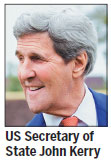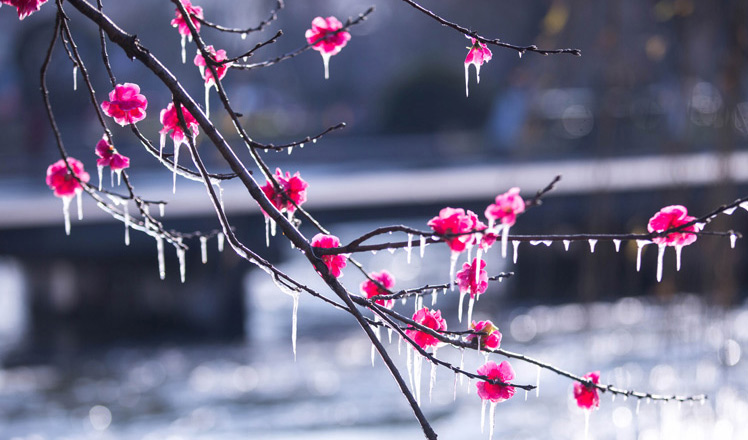Experts question Kerry trip's motives
Updated: 2016-01-26 11:28
By Chen Weihua in Washington and Li Xiaokun in Beijing(China Daily USA)
|
||||||||
Chinese and American experts have low expectations for US Secretary of State John Kerry's trip to China, Laos and Cambodia, where he is seen as trying to seek Beijing's support to punish North Korea for its latest nuclear test while looking for countries in Southeast Asia to gang up on China over the South China Sea issue.
Chinese Foreign Ministry spokeswoman Hua Chunying announced Kerry's trip to Beijing on Monday, a trip that she said "China hopes to help deepen communications on a series of important issues and promote coordination and cooperation in various fields".
Kerry began his tour in the Laotian capital of Vientiane on Sunday and then Phnom Penh, Cambodia. A senior State Department official on Sunday described China as the dominant player in the two countries, both economically and politically.
Over the years, the two countries have long opposed US efforts to rally ASEAN (Association of Southeast Asian Nations) against China on the South China Sea issue.
In a background briefing, the senior official described Kerry's trip to Laos and Cambodia as laying the groundwork for the summit that President Barack Obama will be hosting at the Sunnylands retreat in California from Feb 15-16 with the 10 ASEAN leaders.
Laos is the chair of ASEAN in 2016. Obama hosted Chinese President Xi Jinping at Sunnylands in June 2013.
Many Chinese believe that the US is biased in handling the maritime territorial disputes in both the South and East China seas.
It was reported that Kerry's trip to Beijing was added after the Democratic People's Republic of North Korea declared on Jan 6 that it had successfully tested a hydrogen bomb.
The US believes the test was not powerful enough to be a hydrogen bomb, but it has been pushing for stronger United Nations Security Council sanctions on North Korea and also hopes China would use more of its leverage unilaterally.
"It almost goes without saying that the issue of the DPRK and its recent nuclear test will be on the top of the agenda," said the senior State Department official, adding that the South China Sea is also "very much on the secretary's mind and something that he will certainly discuss in depth".
According to the official, Washington believes that China has so far not exerted enough pressure on the DPRK and that it is important for China to join the US, South Korea and Japan in presenting a unified front.
Ted Carpenter, a senior fellow of defense and foreign policy studies at the Cato Institute, described the US policy as "incredibly arrogant, short-sighted".
He said deciding to place more pressure on Pyongyang entails various risks for Beijing, while the United States and its East Asian allies would be the principal beneficiaries. China's leaders will be reluctant to adopt such a course even under the most favorable circumstances.
"Beijing certainly is not likely to take such risks if the United States is simultaneously trying to organize the ASEAN countries into an anti-China bloc. Kerry should grasp that reality," Carpenter told China Daily on Monday.
Shi Yinhong, a professor of US studies at Renmin University of China, said that "though China is angry about the DPRK's recent bomb test, it is unlikely to take the tough measures that the US and ROK have expected, given the complexity of the situation".
"So I do not see any tangible progress on this issue during Kerry's visit to Beijing, though the two sides may thoroughly discuss the matter," he said.
Doug Bandow, a senior fellow at the Cato Institute, said the Obama's administration policy toward North Korea has not worked.
He said the only other alternative is what Beijing has advocated all along - to engage with North Korea.
"Obviously, there's no guarantee that this approach will work either. Nevertheless, it offers what the North most wants - direct contact with America. The Obama administration's insistence that Pyongyang take steps toward denuclearization first is a non-starter. Talking will be necessary before any concessions can be gained," he wrote in an article in the China-US Focus on Jan 21.
Bandow believes negotiations also seem essential to winning greater Chinese support in dealing with the DPRK. In China's view, the US is responsible for creating a hostile security environment for the North.
Shen Shishun, an expert on East Asian studies at the China Institute of International Studies, said that Washington will have a hard time achieving its goals with ASEAN because China's neighbors have deep and broad mutual interests with Beijing.

"China has always taken care of the interests of friendly neighbors when it develops its own economy," Shen said.
And China remains the engine of the Asian economy, he added. "To maintain good relations with China is vital for the stable development of the Laotian and Cambodian economies."
Beijing has opposed the US approach to internationalize the South China Sea territorial disputes and insisted that its disputes with some ASEAN members should be solved through peaceful negotiations among countries directly involved.
The US has long tried to get Laos and Cambodia closer to its camp in a move perceived by China as trying to curtail its influence in the region. Early this year, the US had pressured its allies not to join the Asia Infrastructure Investment Bank (AIIB).
Larry Summers, who served as Obama's chief economic adviser, said on Monday that the US objection was aimed at avoiding its own embarrassment because the US Congress would not approve funding a China-led bank.
Contact the writer at chenweihua@chinadailyusa.com
(China Daily USA 01/26/2016 page1)
- A glimpse of Spring Rush: little migrant birds on the way home
- Policy puts focus on genuine artistic students
- Police unravel market where babies are bought, sold as commodities
- More older pregnant women expected
- Netizen backlash 'ugly' Spring Festival Gala mascot
- China builds Mongolian language corpus
- Special envoy to visit Laos and Vietnam
- El Nino expected to wreak havoc in S. America well into 2016
- Police officer rescues frightened sloth at corner of busy highway
- US Secretary of State visits Laos, aiming to boost ties
- 2 Chinese nationals killed, 1 injured in suspected bomb attack in Laos
- New York, Washington clean up after fatal blizzard

 Creation of China Daily's Tibetan-style font
Creation of China Daily's Tibetan-style font
 Drone makers see soaring growth but dark clouds circle industry
Drone makers see soaring growth but dark clouds circle industry China's Zhang reaches Australian Open quarterfinals
China's Zhang reaches Australian Open quarterfinals
 Spring Festival in the eyes of Chinese painters
Spring Festival in the eyes of Chinese painters
 Cold snap brings joy and beauty to south China
Cold snap brings joy and beauty to south China
 First trains of Spring Festival travel depart around China
First trains of Spring Festival travel depart around China
 Dough figurines of Monkey King welcome the New Year
Dough figurines of Monkey King welcome the New Year
 Ning Zetao, Liu Hong named China's athletes of the year
Ning Zetao, Liu Hong named China's athletes of the year
Most Viewed
Editor's Picks

|

|

|

|

|

|
Today's Top News
National Art Museum showing 400 puppets in new exhibition
Finest Chinese porcelains expected to fetch over $28 million
Monkey portraits by Chinese ink painting masters
Beijing's movie fans in for new experience
Obama to deliver final State of the Union speech
Shooting rampage at US social services agency leaves 14 dead
Chinese bargain hunters are changing the retail game
Chinese president arrives in Turkey for G20 summit
US Weekly

|

|







